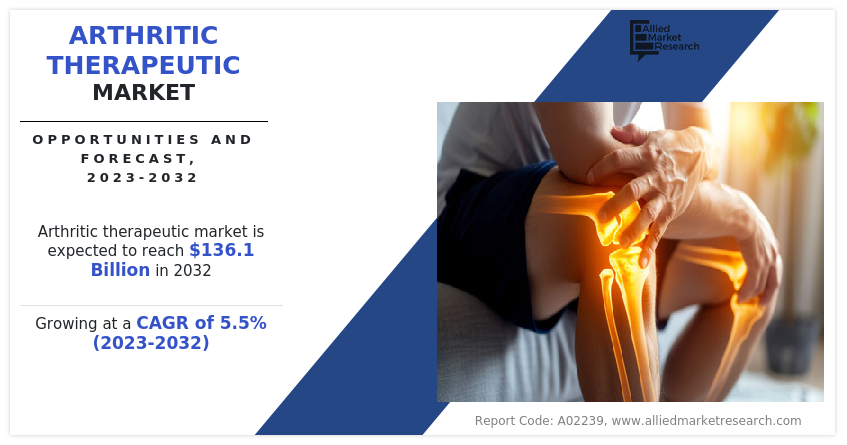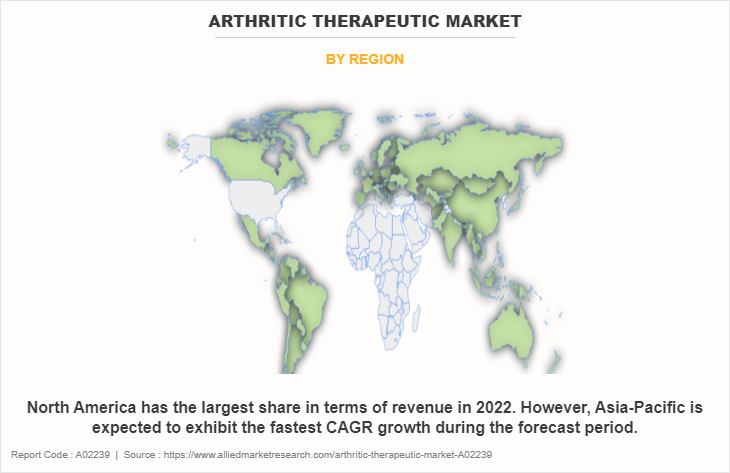
Arthritic Therapeutic Market Poised to Surpass $136.1+ Billion Globally by 2032, Fueled by a 5.5% CAGR

According to a recent report from Allied Market Research titled “Arthritic Therapeutic Market by Product Type (Non-steroidal Anti-inflammatory Drugs (NSAIDs), Disease Modified Anti-rheumatoid Drugs (DMARDs), Biologics, and Others) and Application (Rheumatoid Arthritis, Osteoarthritis, Psoriatic Arthritis, Ankylosing Spondylitis, and Others)”, the global arthritis therapeutics market showed significant growth. In 2022, it reached a valuation of $79.5 billion. Projections indicate a continued upward trajectory, with an estimated value of $136.1 billion by 2032, reflecting a compound annual growth rate (CAGR) of 5.5% between 2023 and 2032.
Request Sample of the Report on Arthritic Therapeutic Market Forecast – https://www.alliedmarketresearch.com/request-sample/2571
Leading Market Players
- AbbVie Inc.
- Pfizer Inc.
- Amgen Inc.
- Novartis AG
- Jhonson & Jhonson
- Viatris Inc.
- Bausch Health (Storz Opthalmic Instrument)
- LEO Pharma
- Merck & Co. Inc.
- Celltrion Inc.
The growth of the global arthritic therapeutic market is influenced by several key factors. Firstly, technological advancements play a crucial role in driving growth, as they lead to the development of more effective treatments and therapies for arthritic disorders. Additionally, the increasing incidence of arthritic disorders and related conditions contributes significantly to market expansion, driven partly by factors such as lifestyle changes and environmental factors.
Moreover, the aging population worldwide is a prime determinant of market growth, as the prevalence of arthritis tends to increase with age. However, despite these growth drivers, the market faces challenges such as growing competition from generic manufacturers, which may impede growth to some extent.
Nevertheless, opportunities abound, particularly with the rise in healthcare expansion initiatives globally. These efforts to improve healthcare infrastructure and access to treatment are expected to create lucrative opportunities for the arthritic therapeutic market during the forecast period, driving further growth and innovation in the industry.
Recession ScenarioIn times of recession, the healthcare industry, including the arthritic therapeutic market, faces notable challenges. Economic downturns often result in reduced investment in technology and innovation, which can hinder the development of new treatments and therapies for arthritic conditions.
However, despite the economic challenges, there are factors that can drive growth in the arthritic therapeutic market even during a recession. Increased awareness about the importance of early diagnosis and treatment of arthritic diseases can lead to heightened demand for arthritic therapeutics, as individuals seek to manage their conditions effectively despite financial constraints.
Furthermore, the rise in the prevalence of arthritic diseases, which often accompanies factors such as aging populations and changes in lifestyle, can sustain demand for arthritic therapeutic products even during economic downturns.
Want to Explore More, Connect to our Analyst- https://www.alliedmarketresearch.com/connect-to-analyst/2571
The non-steroidal Anti-inflammatory Drugs (NSAIDs) segment to maintain its lead position during the forecast period.
The non-steroidal Anti-inflammatory Drugs (NSAIDs) segment is expected to maintain its lead position throughout the forecast period. In 2022, this segment accounted for the largest share of the global arthritic therapeutic market revenue, representing almost two-fifths of the total. This dominance can be attributed to the widespread use of NSAIDs for pain relief and their anti-inflammatory effects, making them a preferred choice among healthcare professionals and patients alike. As a result, NSAIDs generate substantial revenue in the pharmaceutical market.
However, the biologics segment is projected to exhibit the highest compound annual growth rate (CAGR) of 7.0% during the forecast period. This growth is driven by the targeted mechanism of action of biologics, which specifically address inflammatory pathways, leading to effective symptom management and disease modification. Biologics’ precision in targeting key molecules involved in arthritis pathogenesis, combined with ongoing advancements in biotechnology and personalized medicine, contribute to their sustained prominence and anticipated growth in the market.
While NSAIDs maintain their lead position due to their widespread use and effectiveness, the biologics segment is expected to experience rapid growth, fueled by advancements in therapeutic approaches and increasing acceptance among healthcare professionals and patients for their targeted benefits in managing arthritic conditions.
The rheumatoid arthritis segment to maintain its lead position during the forecast period.
The rheumatoid arthritis segment is anticipated to maintain its lead position throughout the forecast period. In 2022, this segment accounted for the largest share of the global arthritic therapeutic market revenue, comprising more than three-fifths of the total. The dominance of this segment is primarily attributed to the increasing prevalence of rheumatoid arthritis worldwide, leading to a heightened demand for targeted and innovative therapies. Ongoing research and development efforts focusing on novel treatments, such as biologics and disease-modifying drugs specifically tailored for rheumatoid arthritis, further contribute to the sustained prominence of this segment in the arthritis therapeutics market.
However, the osteoarthritis segment is projected to exhibit the highest compound annual growth rate (CAGR) of 8.5% during the forecast period. This growth is driven by several factors, including the aging global population, the rising prevalence of obesity, and a growing awareness of osteoarthritis among healthcare professionals and patients. Additionally, advancements in understanding the molecular mechanisms of osteoarthritis and the development of targeted interventions, coupled with efforts to improve pain management strategies, are expected to contribute to the accelerated growth of the osteoarthritis segment within the arthritis therapeutics market.
While rheumatoid arthritis maintains its lead position due to its significant prevalence and the development of specialized treatments, the osteoarthritis segment is poised for rapid growth fueled by demographic trends and advancements in therapeutic approaches targeting this specific condition.

North America maintain its dominance by 2032
In 2022, North America emerged as the dominant region in terms of revenue share within the global arthritic therapeutic market, holding more than two-fifths of the total market revenue. This leadership position can be attributed to several factors, including the region’s well-established healthcare infrastructure, which facilitates access to advanced treatment options for arthritis patients. Additionally, North America experiences a high prevalence of arthritis, further driving demand for therapeutic interventions.
The region’s proactive approach towards healthcare, characterized by increasing awareness about arthritic conditions and the early adoption of advanced therapeutics, also contributes significantly to its market dominance. Furthermore, ongoing research and development activities in the field of arthritis therapeutics, coupled with a robust emphasis on biotechnology and pharmaceutical innovations, further reinforce North America’s leadership position in the global arthritis therapeutics market.
Overall, North America’s comprehensive healthcare ecosystem, combined with its proactive stance towards innovation and treatment advancement, solidify its status as the primary revenue contributor in the arthritic therapeutic market.
For Procurement Information- https://www.alliedmarketresearch.com/purchase-enquiry/2571
Editor Details
-
Company:
- The Wire Times
